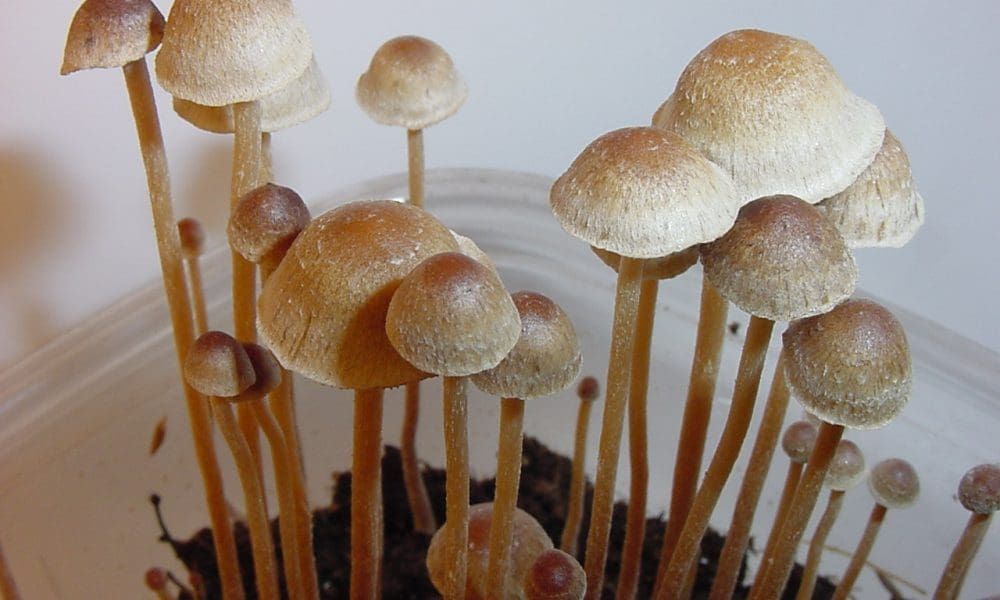In a major milestone on the path to expanding access to psychedelic-assisted therapy among the nation’s military veterans, the Department of Veterans Affairs (VA) has issued a request for applications to conduct in-depth research on the use of psychedelics to treat post-traumatic stress disorder (PTSD) and depression.
The department, which said it’s the first time since the 1960s that it will fund psychedelics research, “intends to gather definitive scientific evidence on the potential efficacy and safety of psychedelic compounds such as Methylenedioxymethamphetamine (MDMA) and psilocybin when used in conjunction with psychotherapy to treat Veterans with PTSD and depression,” it said in a press release Friday.
“Our nation’s Veterans deserve the very best care, and VA is constantly supporting innovations to deliver that,” Secretary of Veterans Affairs Denis McDonough said in announcing the new development. “This is an important step to explore the efficacy of a potential new set of promising treatments that could improve the health and quality of life for Veterans.”
While VA researchers have already conducted what the department called “a limited number of small studies on psychedelics in VA facilities using non-VA funding,” it said the forthcoming research “will permit the important next step of directly assessing effectiveness and safety of using MDMA and psilocybin-augmented psychotherapy in Veterans.”
“Veterans and VA researchers have told us about the potential promise of psychedelics to treat mental health conditions for some time,” said Shereef Elnahal, VA’s undersecretary for health, referencing the premiere episode of an agency podcast that focused on psychedelic-assisted therapy. “Now is our chance to study this potential method of treating Veterans with PTSD and major depression across the country.”
The VA release also notes that in September, “more than 75 VA and other federal clinicians, scientists and policy makers gathered in Denver to assess the state of existing scientific evidence regarding psychedelic-assisted therapies,” a conference at which working groups “provided advice to VA leadership, including the recommendation for VA to begin funding its own studies into these compounds.”
Specific details about the research at the heart of the new request for application (RFA) are scarce, as VA has yet to publish the document online. The department did not immediately respond to a request for information from Marijuana Moment.
In Congress, the two bipartisan co-founders of the Congressional Psychedelics Advancing Therapies (PATH) Caucus cheered the news as a “huge” development.
“To say this moment is monumental would be an understatement,” Rep. Lou Correa (R-CA) said in a statement Friday. “We’ve been fighting for years to push the VA to research the impact of breakthrough therapies, like psychedelics, on the invisible wounds of our country’s most valiant warriors—with the House passing our amendment to do just that last year. These therapies promise to be one of the largest breakthroughs in mental health treatment in nearly half a century, and, with some reported signs of up to 80% success in treatment, shows a possibility to cure our veterans of their invisible wounds—and be the first step toward tackling our national mental health crisis head-on.”
PATH Caucus co-founder Rep. Jack Bergman (R-MI), for his part, called the news “the next first step” and pledged to “continue fighting to advance these promising therapies that could save the lives of countless Veterans.”
“If psychedelic-assisted therapy can help treat a servicemember or Veteran’s PTSD, or prevent them from taking their own life,” Bergman said in a statement, “then we owe it to them to take an active role in researching these potentially life-saving therapies.”
Rep. Morgan Luttrell (R-TX), a retired Navy SEAL who used psychedelics to help treat a traumatic brain injury, applauded the VA announcement.
“This is great news for our veterans that lays the foundation for us to save the lives of those that have so generously served our country,” he said in an emailed release. “This is tremendous progress for the VA, made possible by working closely with Secretary McDonough and the House Committee on Veterans Affairs’ commitment to finding better solutions for our veterans. We must continue to push forward on these groundbreaking efforts to give those facing these issues another tool in the proverbial toolbox.”
Luttrell has publicly shared how treatment with ibogaine and 5-MeO-DMT “changed my life” and was “one of the greatest things that ever happened to me.” Last year he championed the inclusion of psychedelics research provisions in a large-scale federal defense bill that was signed into law by President Joe Biden (D) last month.
The VA release said that expanding psychedelics research for veterans “is also in line with calls from Veterans Service Organizations such as the American Legion and Disabled American Veterans, as well as mental health provider groups.
Steps toward broader access are also supported by a large majorities of veterans’ family members, the general public and military members and veterans themselves, according to an Ohio State University survey of 1,168 people.
Among veterans and active military respondents, nearly two thirds (64 percent) supported allowing VA doctors to legally recommend psychedelics to veterans if they believe it could benefit the patient—a proposition with even more support among military family members (78 percent) and the general public (76 percent).
In November of last year, lawmakers in a U.S. House subcommittee met for a first-ever congressional hearing on psychedelics, with the panel focusing on how substances like psilocybin and MDMA can aid therapy for military veterans’ facing mental health challenges.
And in California, a Republican lawmaker filed legislation earlier this month to create a state workgroup that would be tasked with exploring a regulatory framework to provide therapeutic access to psychedelics like psilocybin and ibogaine and eventually allow health professionals to administer certain psychedelics to military combat veterans.
The Drug Enforcement Administration (DEA) this month also confirmed that the spores of psychedelic mushrooms are federally legal prior to germination because they do not contain the controlled substances psilocybin or psylocin.
Congressman Tells DEA To Reschedule Marijuana ‘As Swiftly As Possible’
Photo courtesy of Wikimedia/Workman.
Read More Feedzy

